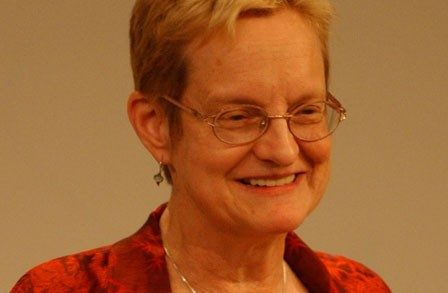An interview with Heather McHugh
An interview with poetry faculty member Heather McHugh was recently featured by the Poetry Society of America. Read an excerpt of the interview below:

Buckle & Swash: Heather McHugh interviewed by Kary Wayson
I’d love it if you started out by locating us—where are you?
I am living (of late) in a rural area south of Port Townsend on the Olympic Peninsula. I wouldn’t be here if it weren’t for my fair-play attempt to triangulate with my late-life passion (it’s a man). We both are wedded to some origin and independence stories—his centering on Washington State, mine on British Columbia; but at the moment we’re fair-smitten with each other, and at seventy and up, I tell you that’s a sweetness you don’t want to jeopardize.
Muddy Matterhorn is your first book in ten years. You’ve spoken elsewhere about a time after winning the MacArthur when you stopped making poems. I remember asking you at that time if the stoppage made you anxious or fearful—and, memorably, you replied that you felt no anxiety about your artistic output because your senses of curiosity and wonder were alive and well. Have there been times when you have worried over such things?
Not really. There were always so many forms of play to work at! Poems are only passages, and all art forms remind you passages are openings. I’m promiscuous about the arts. I was writing jingly verse when I was four, but I also always loved visual design and architecture; as a teen I painted and sculpted; recently I played around a bit with sound files and spoken word. I took time out from teaching, too, for the caregiver-respite project. That benevolence itself changed me, taught me plenty, changed its own forms. (Nonprofits seem to need more gifted profiteers than I.) In any case, after times away, I seem to home to poems.
So what do you worry about?
I worry when I write, not when I don’t.
I hate being visible but wind up being seen—I neither dazzle nor boggle (indeed nowadays I waddle, what with the weight and the bad knee). Stuff like that would have worried me, in my teens, but not so much since I started, around age eighteen, to pay for my own Twinkies. (Well, in all good taste, let’s call it baklava.)
As for rent (or its garments and garnishments), god knows I won’t let anybody else make me a living, or make me a mannequin. I’ve been lucky to have choices, especially in the form of jobs without dress codes, jobs without punch cards. I have cut back on some fancies: Fancy dress and fancy fender I can live without. I do have a surfeit of sensory alertness: the senses are freedom’s luxuries.
Senses I can exercise, senses I can move and be moved by, keep me fond of life. I do adore the STIR of sights and sounds and the break from my own self-cycling mind. Given an open door I can revisit the world, revise myself.
From the start instinctively I was attracted to the word-musicians and poets who reminded me how much was outside ordinary frames of our control: Stein for the neurolinguistic networks of “Tender Buttons”; Stevens for giving over aesthetic mastery to the ultimate independence of artistic occasion (see “So-and-So Reclining on Her Couch”); or take a look at Robert Creeley’s “The Window,” where responsiveness is sensory responsibility, and where every line gets its due.
Read this poem in its entirety here: https://poetrysociety.org/features/interviews/buckle-swash-heather-mchugh-interviewed-by-kary-wayson



